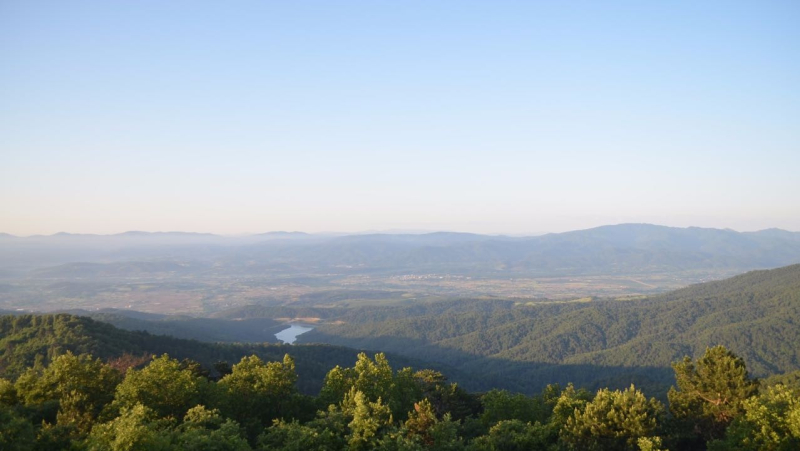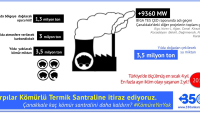Project – On record
This profile is no longer actively maintained, with the information now possibly out of dateBankTrack
climate@banktrack.org

Project – On record
This profile is no longer actively maintained, with the information now possibly out of dateBankTrack
climate@banktrack.org
Why this profile?
The Cirpilar coal power plant would add about 5 million tonnes of CO2 into the Earth's atmosphere thereby contributing to climate change. The project would have adverse impacts on local biodiversity and the rich flora and fauna of nearby Mount Ida national park.
What must happen
The project should be cancelled, as its Environmental Impacts Assessment is not appropriate, and was rejected by the court in April 2020. It is planned on valuable agricultural land of which over 10,000 people’s livelihood depend. The process requires a cumulative impact assessment. However, given current Turkish energy policies, there is a chance that the project will proceed despite the problems in its EIA.
The Paris Climate Agreement goals require a managed decline of fossil fuel production. The construction of new coal-fired power plants is not compatible with this goal. Banks must immediately stop financing new coal-fired power plant developments anywhere in the world. As such, banks should steer clear of financing this project.
| Sectors | Coal Electric Power Generation |
| Location |
|
| Status |
Cancelled
Design
Agreement
Construction
Operation
Closure
Decommission
|
| Website | http://taszemin.com.tr/ |
The Çırpılar power plant is a proposed coal-fired power plant to be located in the Çanakkale province, near Çırpılar, Turkey. It would be fuelled by a new open-pit lignite (brown coal) mine, which would cover an area of 845 hectares. The plant would consume 3.5 million tonnes of lignite per year, and produce 200MW of thermal energy. Storage for 465,000 tonnes of coal would be developed, covering an area of around 90 football pitches (36.5 hectares) on the edge of the pristine Mount Ida.
Social and human rights impacts
The project could have severe impacts:
- on the region’s drinking water reservoir, Yenice-Gönen streamlet, only 2 kilometers away from the project area;
- on 28,606 ares of arable land on which more than 10,000 people are dependent;
- on eco-tourism, as the area hosts thousands of local and international tourists every year visiting Mount Ida national park, which is known for its biodiversity and hiking trails.
Health and pollution impacts:
- As the project’s Environmental Impact Assessment acknowledges, the lignite to be extracted and used for the power plant is quite low-rank (1200 kcal/kg) with a high level of ash (53%). As lignite has a much lower energy density than hard coal, three times more lignite needs to be combusted for the same amount of electricty production. For this reason, more pollutants get emmited by a lignite power plant than a hard coal plant. Turkish lignite has low caloric value and high levels of ash, humidity and sulphur; thus, it causes more air pollution;
- Moreover, studies clearly demonstrate that the cumulative impact of planned coal power plants in the Çanakkale region may cause asthma for 4,440 children and 36,000 adults.
Environmental and climate impacts
Currently (2020), Turkey has 47 grid-connected coal power plants emitting about 140 million tons of CO2 annually. At the same time, Turkey is planning to expand its fleet of coal power plants. The Canakkale region in Turkey is one of the main hotspots for new coal-fired power plant developments in Turkey, with 13 projects with a total capacity of 15,000 MW now proposed. The Çırpılar coal power plant would emit about 5 million tons of CO2 per year. Having more than 70 new coal power plants by 2023 in total in Turkey, as is new planned, would add 200 million tons of CO2 emissions, which would make Turkey one of the world’s major emitters and a ticking climate bomb right next to the EU.
The levels of toxic particles and NO2 in the air over the entire Canakkale region and beyond would increase the risk of diseases such as stroke, lung cancer, heart and respiratory diseases in adults, as well as respiratory symptoms in children. This leads to premature deaths from these causes. SO2, NOx and dust emissions contribute to toxic particle exposure.
The project also risks the pristine environment of Mount Ida and its vast biodiversity. In 2015, local authorities in the area submitted an application to include the mountain in UNESCO's World Heritage list.
Turkish bank Garanti BBVA is expected to be involved in financing the Cirpilar coal power plant as the bank still heavily finances Turkish coal power plants (Garanti BBVA website).
Project sponsor
Taşzemin İnşaat
Turkey2021
2021-08-03 00:00:00 | Cirpilar coal power plant cancelled
According to Coal Exit Tracker the Cirpilar coal power plant has been cancelled.
2020
2020-04-24 00:00:00 | Cannakale Court decides to cancel EIA approval of Cirpilar project
The Çanakkale Administrative Court decided in favor of Kazdağı Society for Conservation of Cultural and Natural Assets and TEMA Foundation and canceled the EIA approval decision of Ministry of Environment and Urbanization for Çırpılar CP project (Evrensel.net).
2019
2019-05-30 00:00:00 | EIA process has restarted
On the 30th of May 2019, the Çanakkale Provincial Directorate of Urbanization and Environment announced that the EIA process for the Cirpilar coal project has restarted, according to the application from KİAŞ - a subsidiary of Turkish Coal Enterprises-TKİ (Cannakale.csb.gov.tr).
2018
2018-10-22 00:00:00 | CSOs file lawsuit
Kazdağı Society for Conservation of Cultural and Natural Assets, TEMA Foundation, Agriculture Engineers Chamber filed a lawsuit against the decision of the court, supported many NGOs and chambers such as Right to Clean Air Platform, İda Solidarity Association, Green Yenice Association and Yuva Association. In October 2018 the Çanakkale Administrative Court decided on the suspension of execution and ordered a repeat of the investigation by experts for the EIA after the lawsuits from local and international NGOs and platforms (Sozcu.com.tr).
2018-06-29 00:00:00 | Environmental Impact Assessment approved
After investigation and evaluation meeting, against all the opposition of local platforms, NGOs and deputies, the Ministry of Environment and Urbanization approved and accepted the Environmental Impact Assessment (EIA) as final at 29th of June 2018 (Cannakaleolay.com).

